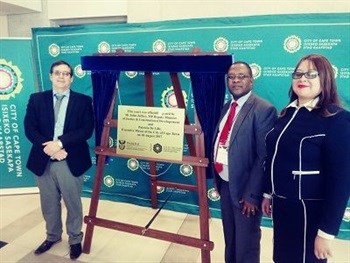The Goodwood Municipal Court, having been demolished last year as part of the precinct upgrade, was reopened officially on 18 August 2017 by the City of Cape Town's Mayoral Committee Member for Area Central, Councillor Siyabulela Mamkeli, and the Deputy Minister of Justice and Constitutional Development, John Jeffery.
In addition to the municipal court, other departments located within the precinct are Fire and Rescue Services, Disaster Risk Management, Traffic Services and Transport and Urban Development Authority (TDA).
Extending justice
The City’s partnership with the relevant stakeholders dates back to 2000, when a Memorandum of Understanding was concluded with the Department of Justice, the Director of Public Prosecutions, and other stakeholders to establish the first municipal court on 18 April 2000, known as the Cape Town Municipal Court, which operated from the City Hall.
Today, the City operates 11 municipal courts that are located across the metro in Parow, the CBD, Goodwood, Strand, Blue Downs, Mitchells Plain, Wynberg, Khayelitsha, Atlantis, Simon’s Town and Somerset West.
“Such partnerships between the various spheres of government are crucial to enable us to deliver services successfully to our residents. Only if we work in close collaboration will we be able to make progress possible. Our customers need to be at the centre of all we do. It is important to note that some court functions, such as traffic violation representations prior to set court dates, are not limited to the residents of Goodwood and surrounding areas only, but are open to residents from outside these areas and working within the Goodwood municipal court jurisdiction area,” said Councillor Mamkeli.
Extended hours
The new Goodwood Municipal Court has a number of enhancements such as improved access for the public to pay their fines and to make enquiries and representations. Parking is close to the court, which allows ease of access for clients. The lighting for the court complex has been upgraded and fitted with motion sensors to help to save on electricity consumption. The access from the holding cells to the court has been newly designed in such a way that there will be minimal disruption of court proceedings.
Many years ago, the Goodwood Municipal Court dealt with a court roll of approximately 300 cases per day. More recently this number has increased to about 450 cases per day and includes first appearance cases, Section 72 cases, by-law transgressions and arrests.
In view of the increasing workload, the court will sit on a Monday, Wednesday and Friday, with a dedicated magistrate, two prosecutors and administrative support staff that include court interpreters and court orderlies.
Extended caseload
Initially the role of the municipal courts was to primarily prosecute cases related to traffic offences. However, over the years there has been a gradual increase in the number of cases brought before the court through the municipal enforcement of the local authority by-laws and national legislation related to the following:
- The National Building Regulations
- Health legislation
- The Business Act
- The Municipal Planning By-law dealing with land-use issues and enforcement
- The Streets, Public Places and Prevention of Noise Nuisances By-law, in other words prohibited behaviour and noise nuisances
- The enforcement of the Graffiti, Informal Trading, Community Fire Safety, Air Quality, Animal and Environmental Health By-laws
- The enforcement and prosecution of water-wasters in terms of the Water By-law, especially during this period of drought
Municipal courts operate in accordance with, among others, the Magistrates’ Court Act, the Criminal Procedures Act, and the various Department of Justice codes.




























